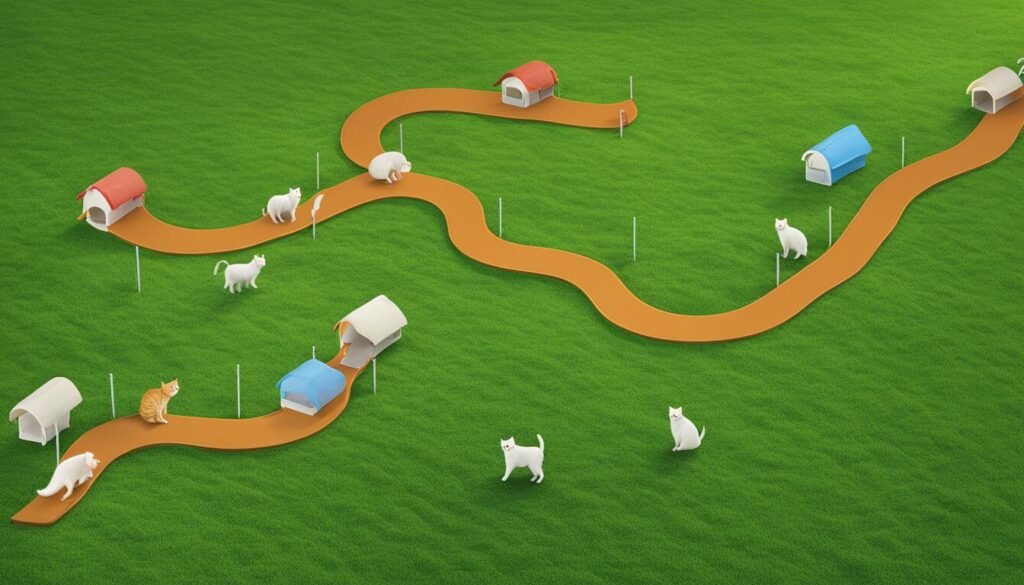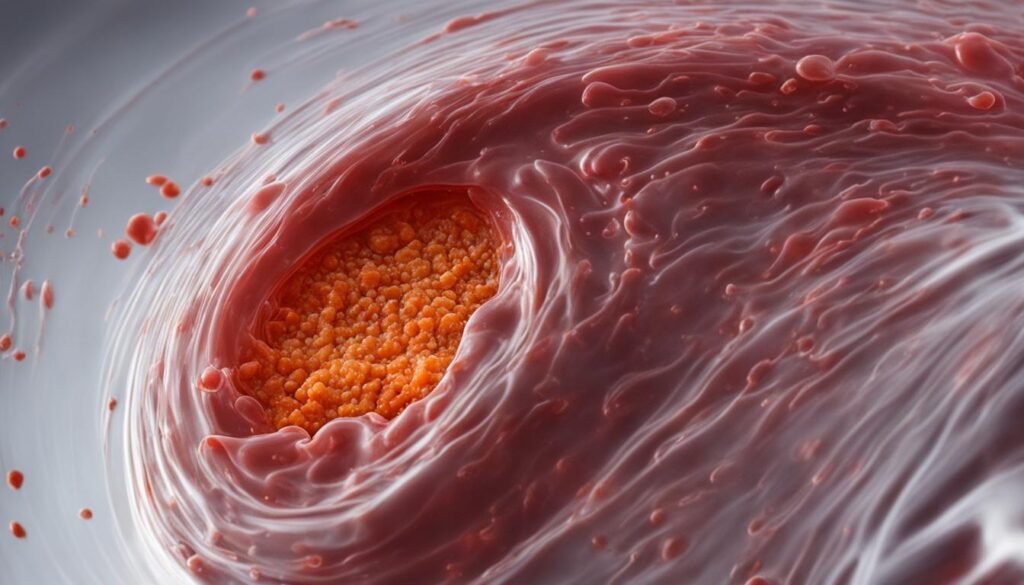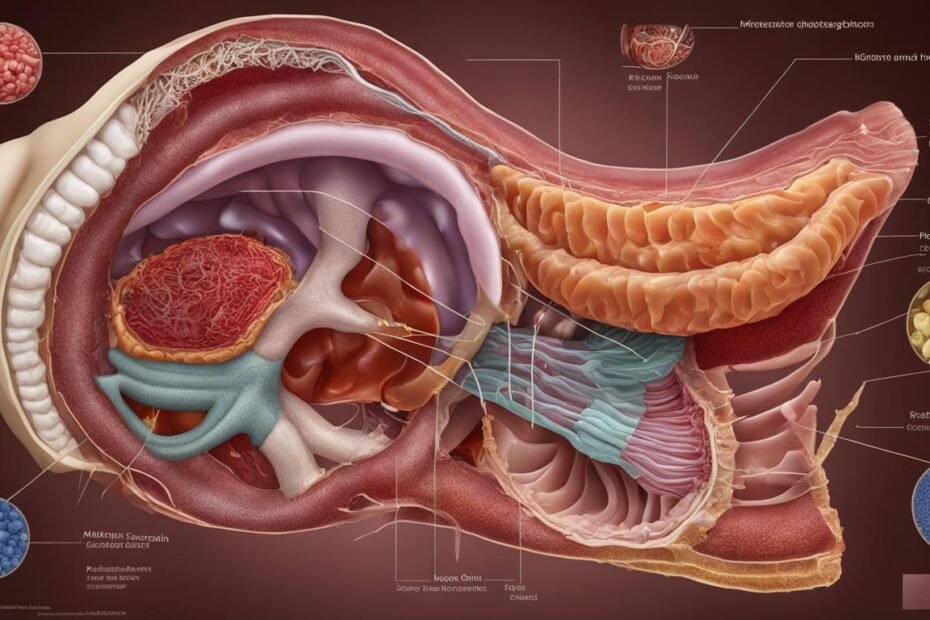Welcome, cat owners! As responsible pet parents, it’s essential to understand the intricacies of your feline friend’s digestive system. Cats are obligate carnivores, meaning their diet must include meat to meet their nutritional needs. This comprehensive guide aims to provide you with a deeper understanding of cat digestion, the importance of a balanced diet, and tips for supporting your cat’s digestive health.
Key Takeaways:
- Cat Digestion Understanding is crucial for their overall health and well-being.
- Cats are obligate carnivores, meaning they need meat in their diet to thrive.
- A balanced diet is essential for meeting your cat’s nutritional requirements.
- Proper hydration plays a vital role in maintaining optimal digestion and urinary tract health.
- Consulting with a veterinarian is important for addressing any digestive disorders or allergies your cat may experience.
The Basics of Cat Digestive Anatomy
Cats have a complex digestive system consisting of various organs that work together to process food and extract nutrients. Understanding the basics of cat digestive anatomy is essential for pet owners to provide appropriate care and support their cat’s overall digestive health.
The Digestive Organs
The cat’s digestive system includes several organs, each with a specific function. These organs include:
- Mouth: The first step in digestion begins with the mouth, where food is broken down into smaller pieces through chewing and mixed with saliva.
- Esophagus: The esophagus carries food from the mouth to the stomach through muscular contractions.
- Stomach: The stomach is responsible for further breaking down food using stomach acid and enzymes.
- Liver: The liver produces bile, which helps in the digestion and absorption of fats.
- Pancreas: The pancreas produces digestive enzymes that aid in the breakdown of proteins, fats, and carbohydrates.
- Intestines: The small intestine is where the majority of nutrient absorption occurs, while the large intestine is involved in the reabsorption of water and the elimination of waste products.
- Rectum and Anus: These organs are responsible for the elimination of solid waste from the body.
Youtube video
The Digestive System Function
The cat digestion system has the primary function of breaking down food into smaller particles, absorbing essential nutrients, and eliminating waste products. Each organ within the digestive system plays a crucial role in this process. For example, the mouth and stomach help break down food, while the intestines facilitate nutrient absorption and waste elimination. The liver and pancreas produce digestive enzymes and substances needed for optimal digestion. Understanding the function of each organ helps pet owners recognize the importance of a balanced diet and proper digestion for their cat’s overall health and well-being.
| Organ | Cat | Dog |
|---|---|---|
| Saliva Production | Low | High |
| Stomach Acid | Highly acidic | Less acidic |
| Digestive Enzymes | Specialized for meat digestion | More versatile for a variety of foods |
| Intestinal Length | Short | Long |
Understanding the comparative anatomy of carnivores can provide insights into the digestive differences between cats and other animals. This knowledge helps in tailoring diets and understanding the unique nutritional needs of cats as obligate carnivores.
The Digestive Process in Cats
Cats have a unique digestive process that allows them to efficiently extract essential nutrients from their diet. Understanding how digestion works in cats can help pet owners make informed decisions about their feline companion’s nutrition and overall well-being.
The digestive process in cats begins in the mouth, where enzymes in saliva start breaking down food. As cats are carnivores, their digestive system is specialized for processing animal-based proteins. The food then travels to the stomach, where it undergoes further digestion with the help of stomach acid and enzymes.
From the stomach, the partially digested food moves into the intestines, where enzymes and gut bacteria break down the nutrients for absorption. The small intestine is responsible for the majority of nutrient absorption, while the large intestine absorbs water and electrolytes. Finally, waste products are eliminated through the rectum and anus.

The sequence of steps in the digestive process allows cats to extract essential nutrients, such as proteins, fats, vitamins, and minerals, from their food. Enzymes play a crucial role in breaking down these nutrients into forms that can be easily absorbed and utilized by the cat’s body.
Understanding cat digestion is important for ensuring their nutritional needs are met. Providing a balanced diet that aligns with their natural carnivorous instincts can help support their digestive health and overall well-being.
The Role of the Gut Microbiome in Cats
The gut microbiome plays a vital role in maintaining feline gut health and supporting healthy digestion in cats. This complex community of microorganisms consists of bacteria, viruses, fungi, and other microbes that reside in the intestines. The gut microbiome interacts with the host’s immune system, aids in the digestion and absorption of nutrients, and helps protect against harmful pathogens.
A diverse and balanced gut microbiome is essential for optimal feline health. It helps break down complex carbohydrates, produce certain vitamins, and regulate the immune system. Imbalances in the gut microbiome, known as dysbiosis, can lead to digestive disorders and other health issues in cats. Factors such as diet, stress, antibiotics, and underlying health conditions can disrupt the delicate balance of the gut microbiome.
To maintain a healthy gut microbiome in cats, it is important to provide a balanced and nutritious diet that supports the growth of beneficial bacteria. High-quality cat food containing prebiotics, probiotics, and fiber can promote a healthy gut microbiome. Additionally, minimizing stress, providing regular exercise, and avoiding unnecessary antibiotic use can help preserve the balance of the gut microbiome. Regular check-ups with a veterinarian can ensure that any potential imbalances are identified and addressed promptly.
The Benefits of a Healthy Gut Microbiome in Cats:
- Improved digestion: A healthy gut microbiome helps break down and absorb nutrients effectively, ensuring optimal digestion.
- Enhanced immune function: The gut microbiome plays a crucial role in modulating the immune system, helping to defend against pathogens and regulate inflammation.
- Reduced risk of digestive disorders: A diverse gut microbiome can protect against digestive disorders such as diarrhea, constipation, and inflammatory bowel disease.
- Enhanced nutrient production: Beneficial bacteria in the gut microbiome can produce vitamins and other essential nutrients that contribute to overall health.
- Improved mental well-being: The gut-brain axis connects the gut microbiome to brain function, and a healthy gut microbiome has been linked to improved mood and cognitive function in cats.
Gut Microbiome and Digestive Health Summary:
The gut microbiome plays a crucial role in maintaining feline gut health and supporting healthy digestion. A diverse and balanced gut microbiome is essential for optimal nutrient absorption, immune function, and overall well-being in cats. By providing a balanced diet, managing stress, and avoiding unnecessary antibiotic use, pet owners can help promote a healthy gut microbiome in their feline companions.
| Gut Microbiome Benefits | Actions to Support a Healthy Gut Microbiome |
|---|---|
| Improved digestion | Provide a balanced and nutritious diet, including prebiotics and probiotics. |
| Enhanced immune function | Minimize stress and provide regular exercise. |
| Reduced risk of digestive disorders | Avoid unnecessary antibiotic use. |
| Enhanced nutrient production | Regular check-ups with a veterinarian. |
| Improved mental well-being |
Common Cat Digestion Disorders and Allergies
Cats, like humans, can experience a range of digestive disorders and allergies that can significantly impact their overall health and well-being. Identifying and managing these issues is crucial for ensuring that your feline companion maintains optimal digestive health. Some common cat digestion disorders include:
- Diarrhea: This is characterized by loose, watery stools and can be caused by various factors, including dietary changes, food intolerances, infections, or underlying health conditions.
- Constipation: This occurs when a cat has difficulty passing stools, which can be hard and dry. It can be caused by a lack of fiber in the diet, dehydration, or certain medical conditions.
- Pancreatitis: Pancreatitis is the inflammation of the pancreas, which can lead to digestive issues, abdominal pain, and loss of appetite in cats. It requires veterinary attention for proper diagnosis and treatment.
- Inflammatory Bowel Disease (IBD): IBD is a chronic condition that causes inflammation in the digestive tract. It can lead to symptoms such as vomiting, diarrhea, weight loss, and poor appetite.
In addition to these digestive disorders, cats can also develop food allergies, which can manifest as gastrointestinal issues. Some common food allergens for cats include fish, dairy, beef, and grains. Food allergies can cause symptoms such as vomiting, diarrhea, skin rashes, and itching. It is important to work closely with your veterinarian to identify the specific allergen and develop an appropriate dietary plan for your cat.
Managing cat digestive disorders and allergies often involves a combination of dietary modifications, medication, and lifestyle changes. Your veterinarian will conduct a thorough examination and may recommend diagnostic tests, such as blood work or fecal analysis, to determine the underlying cause of the digestive issues. Once the cause is identified, they will develop a tailored treatment plan to address the specific needs of your cat.
| Common Cat Digestive Disorders | Common Symptoms |
|---|---|
| Diarrhea | Loose, watery stools |
| Constipation | Difficulty passing stools, dry and hard stools |
| Pancreatitis | Abdominal pain, loss of appetite, digestive issues |
| Inflammatory Bowel Disease (IBD) | Vomiting, diarrhea, weight loss, poor appetite |
| Food Allergies | Vomiting, diarrhea, skin rashes, itching |
The Impact of Stomach Acid and Nutrient Absorption in Cats
The digestive process in cats relies heavily on stomach acid to break down food and facilitate nutrient absorption. Stomach acid, also known as gastric acid, is a crucial component of feline digestion. It is primarily composed of hydrochloric acid, which helps in the breakdown of proteins, activates digestive enzymes, and aids in the destruction of potentially harmful bacteria. Maintaining proper stomach acid levels is essential for cats to extract and utilize nutrients effectively.

Due to their role as obligate carnivores, cats have a unique digestive system that is optimized for processing animal-based proteins. Stomach acid plays a vital role in this process by denaturing proteins and preparing them for further breakdown by digestive enzymes. Without sufficient stomach acid, cats may struggle to digest and absorb essential nutrients, leading to nutrient deficiencies and related health issues.
Stomach acid in cats is crucial for nutrient absorption and overall feline metabolism. It breaks down proteins, activates enzymes, and helps in the elimination of harmful bacteria.
Feline metabolism heavily relies on the efficient absorption of nutrients from the digestive system. Besides proteins, stomach acid also aids in the absorption of fats, certain vitamins, and minerals. This highlights the importance of maintaining a healthy balance of stomach acid to support optimal nutrient absorption and overall feline health.
The Role of Gastrin in Regulating Stomach Acid Production
Gastrin is a hormone that plays a key role in regulating stomach acid production in cats. It is produced by the stomach lining and stimulates the release of gastric acid in response to food consumption. Gastrin secretion is influenced by factors such as the presence of proteins in the stomach, the pH level of gastric acid, and the overall function of the digestive system.
| Factors influencing Gastrin production | Effect on Stomach Acid Production |
|---|---|
| High protein content in the stomach | Stimulates gastrin release and increases stomach acid production |
| Low pH level of gastric acid | Inhibits gastrin release and decreases stomach acid production |
| Compromised digestive function | May result in decreased gastrin production and inadequate stomach acid levels |
Understanding the role of gastrin in regulating stomach acid production can help cat owners make informed decisions regarding their pet’s diet and digestive health. Providing a balanced diet that supports healthy stomach acid production is essential for promoting optimal nutrient absorption and overall feline metabolism.
The Importance of Hydration for Cat Digestion
Adequate hydration is essential for maintaining optimal digestion and urinary tract health in cats. Water plays a crucial role in various bodily functions, including digestion, nutrient absorption, and waste elimination. It is important for pet owners to understand the significance of hydration and take proactive measures to ensure their cats are adequately hydrated.
Cats have a low thirst drive and may not drink enough water on their own. Therefore, it is essential to provide fresh, clean water at all times. Placing multiple water bowls throughout the house can encourage cats to drink more frequently. Additionally, some cats prefer running water, so using a cat water fountain can stimulate their interest and increase water consumption.
Wet cat food can also contribute to hydration as it contains a higher moisture content compared to dry food. Adding a portion of wet food to your cat’s diet can help supplement their water intake. It is important to note that a balanced diet consisting of both wet and dry food is recommended to meet your cat’s nutritional needs.
Proper hydration not only supports digestion but also promotes urinary tract health in cats. Adequate water intake helps prevent issues such as urinary tract infections and keeps the urinary system functioning effectively. Monitoring your cat’s water intake and ensuring they have access to fresh water throughout the day is essential for maintaining their overall digestive and urinary tract health.
| Weight Range | Water Intake (in milliliters) |
|---|---|
| 4 to 6 pounds | 160-240 mL |
| 7 to 9 pounds | 280-360 mL |
| 10 to 12 pounds | 400-480 mL |
Source: American Association of Feline Practitioners
It is important to monitor your cat’s water intake and consult a veterinarian if you notice any significant changes or signs of dehydration. Overall, prioritizing hydration is essential for supporting your cat’s digestive health and overall well-being.
Conclusion
Understanding cat digestion and nutrition is crucial for pet owners in order to ensure the health and well-being of their furry friends. Cats, as obligate carnivores, have specific dietary requirements and their digestive system is designed to efficiently process animal-based proteins. By providing a balanced diet and monitoring their hydration levels, you can support your cat’s overall digestive health.
Cat digestion understanding is essential because it allows you to make informed decisions about their nutrition. This comprehensive guide has provided insights into the basics of cat digestive anatomy, the step-by-step digestive process, the role of the gut microbiome, common digestive disorders, and the importance of stomach acid and hydration.
By following the guidelines outlined in this guide, you can ensure that your cat receives the necessary nutrients for optimal health. Remember to consult with a veterinarian if you suspect any digestive disorders or allergies in your cat. Paying attention to their digestive health is a key component of being a responsible pet owner.
FAQ
What is the importance of understanding cat digestion?
Understanding cat digestion is important for pet owners to ensure the health and well-being of their feline companions. Cats have specific dietary requirements as obligate carnivores, and their digestive system is designed to process animal-based proteins efficiently.
How does the cat’s digestive system work?
The cat digestion system consists of multiple organs, including the mouth, esophagus, stomach, liver, pancreas, intestines, rectum, and anus. Each organ plays a specific role in the process of digestion, absorption of nutrients, and elimination of waste products.
What is the role of stomach acid in cat digestion?
Stomach acid plays a vital role in the digestion and absorption of nutrients in cats. It helps break down proteins, activates digestive enzymes, and kills potentially harmful bacteria. Proper stomach acid levels are essential for the absorption of nutrients.
Why is the gut microbiome important for cat digestion?
The gut microbiome refers to the community of microorganisms living in the intestines. In cats, a healthy gut microbiome is crucial for proper digestion and overall health. These microorganisms help in breaking down complex carbohydrates, producing certain vitamins, and supporting immune function.
What are some common cat digestive disorders and allergies?
Cats can experience a range of digestive disorders, including diarrhea, constipation, pancreatitis, and inflammatory bowel disease. These conditions can be caused by various factors, including food allergies, intolerances, or underlying health issues.
How can I ensure proper hydration for my cat digestion?
Adequate hydration is crucial for maintaining optimal cat digestion and urinary tract health in cats. It is important for pet owners to provide fresh, clean water at all times and encourage their cats to drink. Wet cat food can also help supplement hydration as it contains a higher moisture content compared to dry food.
Why is a balanced diet important for cat digestion?
Cats are obligate carnivores, meaning they require meat in their diet. Their digestive system is designed to process animal-based proteins efficiently. Providing a balanced diet is essential to ensure they receive the necessary nutrients for optimal health.
How can I support my cat’s digestive health?
Supporting your cat’s digestive health involves providing a balanced diet, monitoring hydration, and addressing any digestive disorders or allergies. Working closely with a veterinarian is crucial in managing these conditions and ensuring your cat’s overall well-being.
